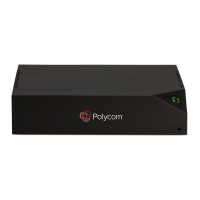
Do you have a question about the Polycom Pano and is the answer not in the manual?
| Brand | Polycom |
|---|---|
| Model | Pano |
| Category | Projector Accessories |
| Language | English |
Provides information on how to get help with Polycom products, including contacting support for installation and configuration.
Instructions for initial setup of the Polycom Pano device by an administrator, ensuring it is ready for use.
Describes the Pano device's home screen, its elements, and what it displays when the device starts up or exits a session.
Details the various elements present on the Polycom Pano device's home screen that facilitate collaborative meetings.
Explains how to begin collaborating using the Pano device, either by opening a blackboard or sharing content from a device.
Instructions on how to stream your screen, an application, or files from OneDrive via the Polycom Cloud Service to a Pano system.
Guide on sharing screen and audio from Miracast-certified devices like Windows or Android to the Pano system.
Instructions for sharing screen and audio from AirPlay-certified devices like iPhone, iPad, or Mac to a Pano device.
Details on connecting a personal device via HDMI cable to share content directly with the Pano device.
Procedures for properly ending a content sharing session on the Pano device to prevent data loss or disruption.
Information on features not supported by the Polycom Pano device for content sharing, such as HDCP and certain streaming sources.
How to use touch capabilities to manipulate and navigate content on the Pano device, including toolbar and content tray access.
Explanation of how active content sources are displayed during a session, and where other sources are stored in the content tray.
Description of the various icons and their functions within the Pano device's annotation toolbar for content interaction.
Steps to write annotations on blackboards, whiteboards, live content, or snapshots using the toolbar and touch input.
How to use the highlighter tool for temporary emphasis on content, noting its fading behavior and alternative annotation methods.
Methods for removing annotations from the screen, including single-finger gestures and multi-finger circular motions.
Guide on using the pointer tool to select and navigate content shared from the Polycom Cloud Service.
Procedures for undoing the last annotation or all annotations, and the option to restore them.
Instructions on how to capture a snapshot of the current screen or content, including annotations and highlighter marks.
How to view and switch between live content and captured snapshots within the content tray.
Steps to create new blank blackboards or whiteboards for ideation and collaboration directly on the Pano device.
How to access the screen that provides tips on interacting with the Pano device, including toolbar elements and gestures.
Procedure for ending a sharing session, noting that live content is stopped and whiteboards/blackboards are deleted.
How to zoom in/out and pan shared content on the Pano device using touch gestures.
Explanation of the menu control available on content panels for minimizing, maximizing, and closing items in a multi-content session.
Instructions for downloading and installing the Polycom Pano App software from Polycom Support onto a user's device.
Guide on sharing content using the Pano App, with or without signing into the Polycom Cloud Service.
Steps to connect to a Polycom Pano or video system before sharing content, including options like Nearby Rooms and Recent Rooms.
Details on sharing local content, cloud content, or a combination, including connection requirements and procedures.
Tips and procedures for troubleshooting common issues with the Polycom Pano App, such as sending log files.
Information that administrators may request for troubleshooting, such as system serial number and software version.
Instructions on how to find the system serial number, typically located on the bottom of the Polycom Pano system.
Guidance on how to find the system IP address, which is viewable on the Pano device's home screen.